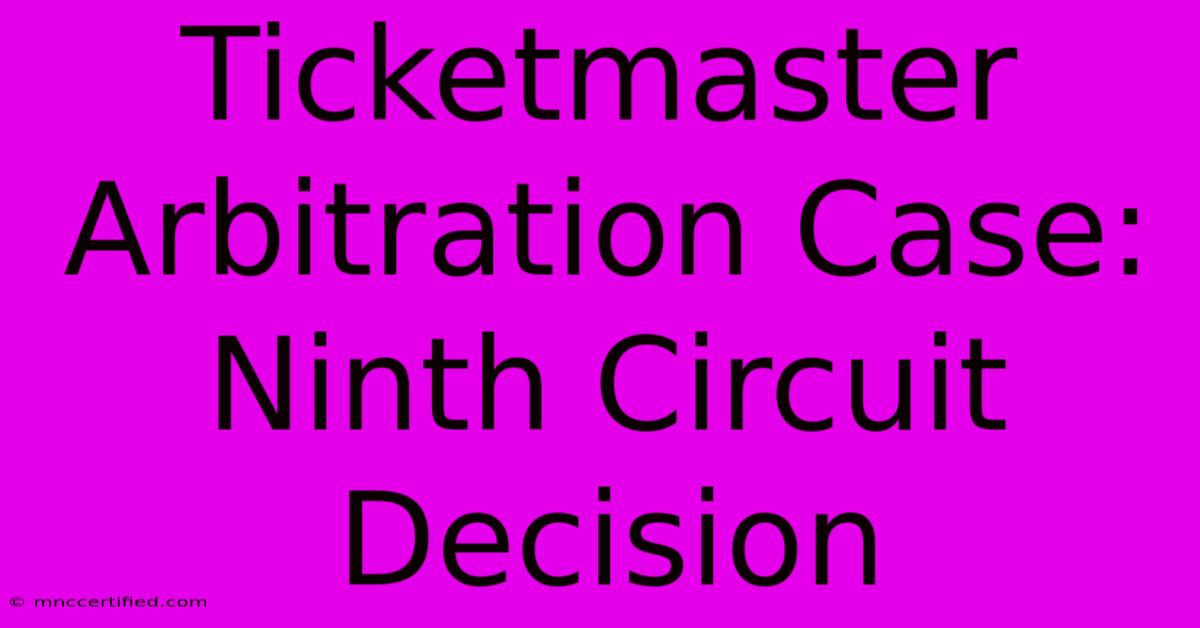Ticketmaster Arbitration Case: Ninth Circuit Decision

Table of Contents
Ticketmaster Arbitration Case: Ninth Circuit Decision – A Deeper Dive
The Ninth Circuit Court of Appeals' decision in the Ticketmaster arbitration case has sent ripples through the entertainment industry and beyond, raising significant questions about the enforceability of arbitration clauses in consumer contracts. This article will delve into the specifics of the case, analyze the Ninth Circuit's ruling, and explore its broader implications for consumers and businesses alike.
Understanding the Case: Ticketmaster and Forced Arbitration
The core of the case revolves around Ticketmaster's use of mandatory arbitration clauses in its terms of service. These clauses require customers to resolve disputes with Ticketmaster through private arbitration rather than in a public court. Critics argue this system favors corporations like Ticketmaster, limiting consumers' ability to pursue class-action lawsuits and potentially deterring them from pursuing legal action altogether due to the cost and complexity of arbitration.
The plaintiffs in this case argued that Ticketmaster's arbitration clause was unconscionable, meaning it was so unfair and one-sided as to be unenforceable. They pointed to the significant cost disparity between individual arbitration and class-action litigation, effectively preventing consumers from effectively challenging Ticketmaster's practices. This is a crucial aspect frequently discussed in mandatory arbitration cases, highlighting the potential imbalance of power.
Key Arguments Presented
The plaintiffs' arguments focused on several key points:
- Unfair cost burden: The cost of individual arbitration often outweighs the potential individual damages, making it financially impractical for consumers to pursue their claims.
- Lack of transparency: The arbitration process itself often lacks the transparency of a public court, limiting public accountability for corporate wrongdoing.
- Waiver of class action rights: The forced arbitration clauses often specifically prevent consumers from joining class-action lawsuits, even when their claims are similar to others, diminishing the collective power to challenge unfair practices.
- Violation of consumer protection laws: The plaintiffs argued that Ticketmaster's practices violated various consumer protection laws.
The Ninth Circuit's Ruling: A Partial Victory for Consumers?
The Ninth Circuit's decision did not entirely invalidate Ticketmaster's arbitration clause. However, it did significantly limit its scope. The court found that while the arbitration clause itself was valid, the provision prohibiting class actions was unconscionable and therefore unenforceable. This means that while individual consumers are still largely bound by the arbitration clause, they are not prevented from pursuing class-action claims.
This partial victory for consumers is a significant development in the ongoing debate surrounding mandatory arbitration clauses. It acknowledges the inherent power imbalance between corporations and individual consumers, implicitly recognizing the potential for abuse embedded within such clauses. The ruling directly addresses the unconscionability of class action waivers in arbitration agreements, setting a vital precedent.
Implications of the Decision
The Ninth Circuit's ruling has several key implications:
- Increased potential for class-action lawsuits against Ticketmaster: This opens the door for consumers to pursue class-action lawsuits against Ticketmaster, potentially leading to significant financial consequences for the company.
- Precedential impact on other businesses: This decision could influence other companies that use mandatory arbitration clauses in their consumer contracts, prompting them to re-evaluate the enforceability of such clauses.
- Shifting the balance of power: The ruling represents a step towards rebalancing the power dynamic between large corporations and individual consumers, enhancing consumer protection.
- Focus on procedural fairness in arbitration: The case highlights the ongoing need for reforms to ensure greater fairness and transparency within the arbitration process.
The Future of Arbitration Clauses and Consumer Protection
The Ticketmaster case is far from over. While the Ninth Circuit's decision is a victory for consumers, Ticketmaster may appeal the decision to the Supreme Court. Furthermore, the broader debate surrounding mandatory arbitration clauses and consumer protection continues. This ruling emphasizes the need for lawmakers to consider legislation that protects consumers from unfair and one-sided arbitration clauses. The ongoing discussion surrounding consumer rights and the balance of power in contract law remains paramount.
The Ninth Circuit's decision represents a crucial step in the ongoing battle for consumer rights. It underscores the importance of critically examining the terms and conditions of online services and highlights the ongoing need for reform to ensure fair and equitable treatment of consumers. The outcome of any further appeals and the broader legislative responses will shape the future of arbitration clauses and consumer protection in the years to come.

Thank you for visiting our website wich cover about Ticketmaster Arbitration Case: Ninth Circuit Decision. We hope the information provided has been useful to you. Feel free to contact us if you have any questions or need further assistance. See you next time and dont miss to bookmark.
Featured Posts
-
Brit Wins 7 4 M Lotto Jackpot
Nov 27, 2024
-
Fwd Voluntary Health Insurance
Nov 27, 2024
-
Harvey Milk Assassination Anniversary
Nov 27, 2024
-
Wildlife Photographer 2024 Top 25
Nov 27, 2024
-
Russias Spy Claim Rejected By Uk
Nov 27, 2024